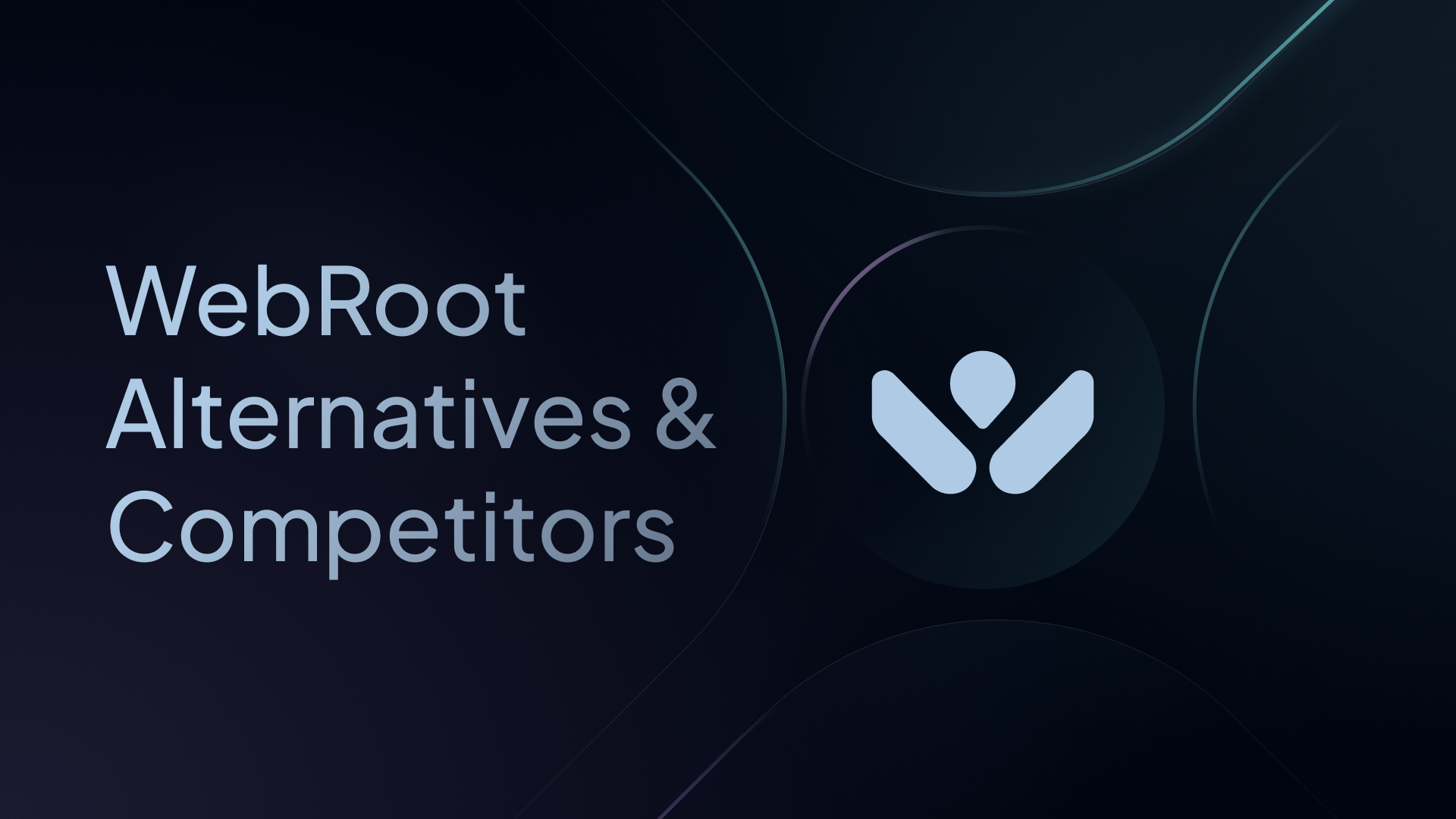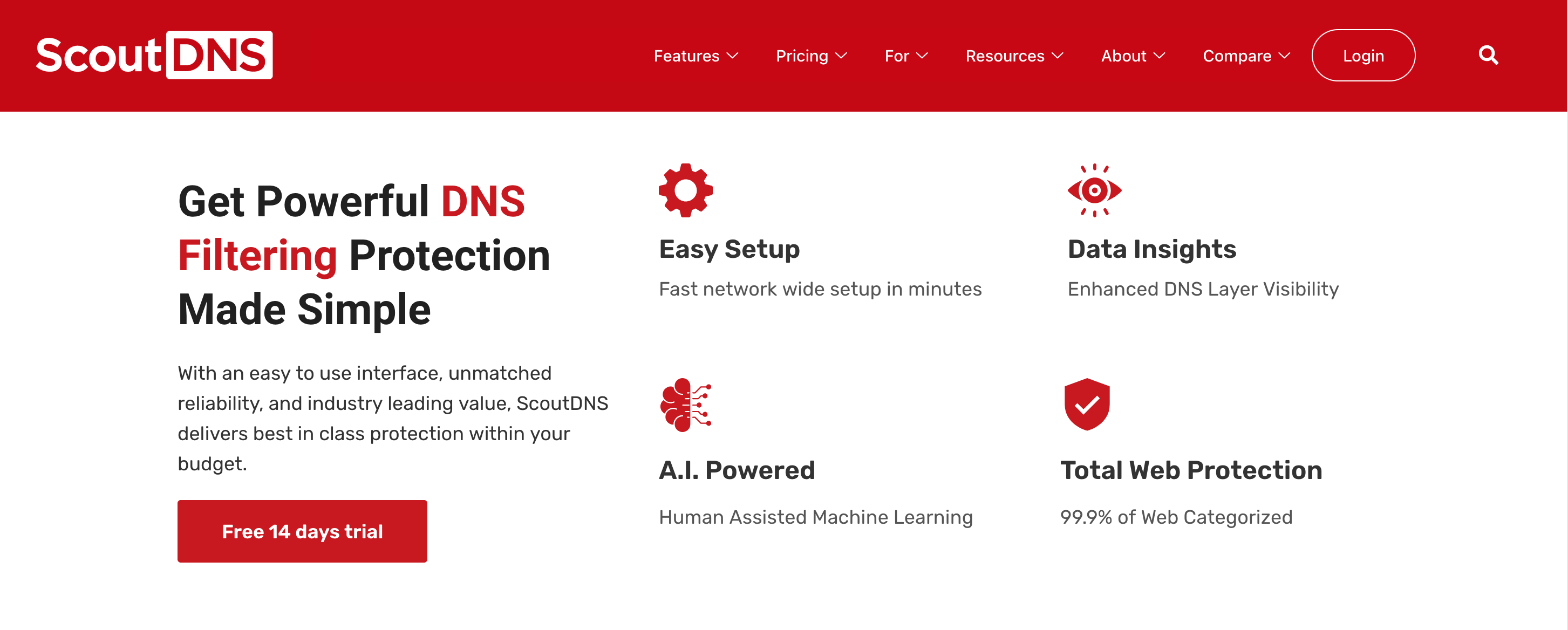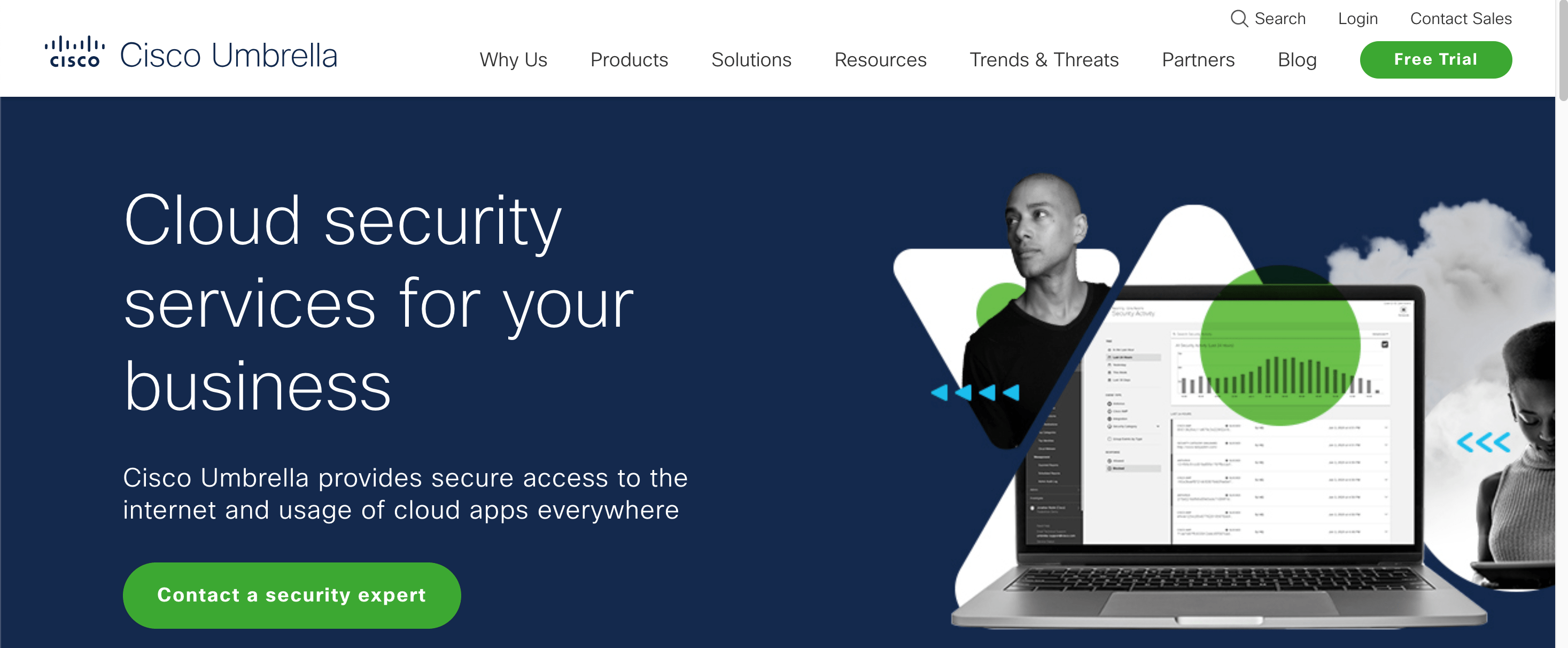9 Best WebRoot Alternatives & Competitors
Learn about the best WebRoot alternatives that deliver a better product ranked on price, features, user experience, and more.

With over two decades of experience, you would think WebRoot would be leading the charge in the cybersecurity space. However, this isn't quite the case.
WebRoot has had mixed reviews, with some users complaining about sub-par threat detection and unhelpful customer support.
While there may not have been many alternatives in the past, nowadays, there are plenty of competitors that not only fill WebRoot’s boots but outperform them in almost every single category.
Let’s take a look at the best WebRoot alternatives in the market today.
1. Control D (Best All-Round Solution)
Control D is the best one-stop-shop for all things DNS related. It offers a robust feature set, timely and responsive customer support, and a smooth onboarding experience to make managing your DNS settings simple and straightforward.
Here’s how Control D compares to WebRoot.
Pricing
WebRoot is priced at $2.5/user/month (based on 25 seats). Businesses that require more than 50 seats must contact WebRoot’s sales team for a personalized quote.
Control D charges a flat per-endpoint rate based on organization type:
- School/Non-Profit: $0.50/endpoint/month
- MSP: $1/endpoint/month
- SMB: $2/endpoint/month
- Enterprise: Contact
This makes Control D the more cost-effective solution.
Features
Both Control D and WebRoot offer:
- Advanced machine learning-based malware protection
- Flexible content blocking
- Active Directory support
- Full API access
Control D can match all of WebRoot's functionality. However, WebRoot does not offer numerous features in Control D's arsenal. The list includes:
- Blockable Services – Control D has over 1,000 apps, platforms, and groups of websites to choose from
- Full modern DNS protocol support – WebRoot only supports DNS-over-HTTPS (DoH)
- Geo-Custom Rules
- Traffic Redirection
- Linux support
- Android & iOS support
As you can see, Control D offers more features, functionality, and compatibility compared to WebRoot.
One important thing to note is how well both services fair in terms of their threat detection capabilities. An independent test found that Control D’s malware filter has a 99.97% block rate, which is the highest among all competitors tested.
While WebRoot was not involved in that specific test, there are countless posts on Reddit describing WebRoot’s inability to detect threats accurately. Here’s an example:
Considering the full suite of features offered by both services and their threat detection capabilities, Control D comfortably wins this round.
Onboarding & UX
Onboarding and management are notoriously difficult on WebRoot, with users complaining that it’s complicated and buggy, making management a “pain”.
On the other hand, Control D is frequently praised for its seamless onboarding experience and easy-to-use UI, which has just become more streamlined thanks to a recent UI overhaul.
Analytics & Reporting
Control D and WebRoot have similar functionality when it comes to analytics and reporting, such as:
- Full query logging
- Query log exporting
- SIEM log streaming
- Scheduled reporting
- Per-user reporting
👉 Start a 30-Day Free Trial of Control D
The main difference between both services is that Control D allows you to choose from three data storage regions (NA, EU, or ANZ) and also gives you the option to select a custom region for an additional cost. Since this may be a minor feature for some users, we’ve rated this category as a tie.
Support
Both platforms offer community support, detailed documentation, and email support.
Control D gets the leg up by also introducing chat support in the form of Barry, an advanced chatbot that is powered by machine learning technology. Barry is built on the collective knowledge of everyone behind Control D, as well as all the information in the documentation.
As a result, most user queries can often be answered by Barry in a matter of seconds, allowing you to focus your time on managing your DNS settings instead of the back and forth of a traditional email or ticket system. However, should your query need the help of a human agent, this can be easily escalated to a member of Control D’s support team.
One thing to note is the quality of support received. Many users on Reddit have complained about the inability to reach WebRoot’s support team or getting a lackluster response when they do.
This drastically differs from the support experience with Control D, with many glowing reviews praising response times and the quality of answers.
Final Thoughts
Users have struggled with WebRoot’s service for years, with many complaints about its effectiveness and lack of customer support. Luckily, many services on the market can take WebRoot’s place, the best of which is Control D.
Control D offers unmatched customization on an already feature-rich service, seamless onboarding experience, and quality customer service should things go wrong, all at a much more cost-effective price point.

2. DNSFilter
DNSFilter is an appealing option for those who want strong filtering capabilities. They offer similar features to Control D, which include:
- AI-powered malware detection
- Flexible content filtering
- Access to over 80 blockable Services
- Full query logging
One of DNSFilter’s attributes is its rapid DNS query speed, often rivalling Cloudflare for the fastest resolution times. However, this speed is paired with trade-offs in reliability since DNSFilter's server uptime and quality consistently rank below that of its competitors.
Compatibility is another concern, as DNSFilter lacks Linux support, modern DNS protocols, and dual-stack functionality. But that’s not all. The pricing structure may not suit those looking for more affordable solutions.
While DNSFilter offers a Pro plan costing $2/user/month, to add core features such as SIEM integration, permanent API token, or the ability to export data, users will have to fork out an additional $0.25/user/month.
Overall, DNSFilter remains an appealing choice for those seeking basic filtering options and fast response times, but it may not suit those requiring full compatibility or consistent server reliability.
👉 Check out our detailed comparison between Control D and DNS Filter.
3. WebTitan
WebTitan is a trusted DNS filtering solution designed to meet the needs of small businesses and MSPs. Its offerings include:
- Malware protection
- Customizable content filtering
- Detailed per-user reporting
- Full API access
Despite its solid foundation, WebTitan has some notable limitations. It does not support Geo-IP blocking or region-based rules and does not offer a predefined list of blockable Services, features that can make network management more efficient.
At a cost of $2.25/user/month for businesses (paid annually), WebTitan is a competitive option for organizations that prefer simplicity and reliability instead of extensive flexibility or cutting-edge features.
4. Zorus
Zorus has a similar target market to WebTitan since they both offer DNS filtering solutions tailored for MSPs. It delivers core functionality, including malware and phishing protection, customizable content filtering, Geo-IP blocking, and full API access. These features make Zorus a solid choice for businesses that require a simple approach to DNS management.
That being said, Zorus does come with some notable shortcomings. It currently lacks compatibility with Android and iOS devices, and its MacOS client is still in beta. Additionally, it does not support SIEM log streaming, which may limit its appeal for organizations that rely heavily on advanced analytics and real-time threat analysis.
For businesses seeking an uncomplicated, reliable DNS solution with essential features, Zorus is worth considering. However, other providers may offer a better fit for those who need comprehensive device support or robust logging capabilities.
5. SafeDNS
SafeDNS offers three plans for different use cases: Basic, Pro, and Pro+. The Basic plan, priced at $1/user/month, covers foundational features such as:
- Basic malware and phishing protection
- Flexible content filtering
- Full API access
For businesses requiring more advanced functionality, the Pro plan at $1.8/user/month includes capabilities like:
- Mobile device compatibility
- Per-user policy enforcement
- Roaming clients and Active Directory support
- DNS-over-HTTPS encryption
The Pro+ plan at $2.5/user/month adds:
- SIEM integration
- Priority phone support
- Personal manager
Although SafeDNS lacks certain features like Geo-custom rules and Traffic Redirection, it stands out for its highly-rated customer support and affordable pricing.
6. ScoutDNS

ScoutDNS is a practical choice for organizations seeking straightforward DNS filtering and content management. It provides many of the core features you’d come to expect from a DNS filtering solution, such as:
- Basic malware and phishing protection
- Customizable content filtering
- The ability to create tailored allow/blocklists for specific clients or policies
- Full API access.
But, it does lack in providing advanced features:
- Does not support iOS and Android devices
- Lacks DNS-over-TLS (DoT) protocol support
- Geo-custom Rules
- Traffic Redirection.
This means that while ScoutDNS can meet basic DNS filtering needs, its limitations can be restrictive for organizations that require more robust DNS management or broader compatibility across different device types.
7. DefensX
DefensX is an MSP-focused DNS security solution. They differentiate themselves by including zero-trust secure web browsing and file protection at an additional cost.
DefensX does not disclose its pricing publicly, which makes it difficult to compare it directly against other services, but there is information on its feature list.
The service is structured across three subscription plans – Core, Core+, and Premium – each providing progressively advanced features. The Core plan offers:
- Flexible content filtering
- Comprehensive query logging
- Modern DNS protocol support
- RMM support
Higher-tier plans include capabilities such as SIEM log streaming, scheduled reporting, full API access, and remote browser isolation, all of which are absent in the entry-level Core plan.
Something to consider is that while DefensX is often praised for its reliable customer support, some users have expressed concerns about the slower pace of feature updates and product development.
8. Cloudflare Gateway
Cloudflare Gateway, a core component of Cloudflare’s extensive Zero Trust suite, is a DNS filtering service tailored primarily for large-scale enterprises. Gateway is one of the most well-known DNS solutions on the market thanks to its fast DNS query speeds and popular free DNS service, but its steep pricing makes it best suited for large enterprises with substantial budgets.
It is offered across three pricing tiers: Free, Pay-as-you-go, and Contract. The Free plan, while accessible, has significant limitations, including the absence of dedicated support and only 24-hour query log retention.
This means that businesses must upgrade to the Pay-as-you-go plan, which starts at $7/user/month. This tier offers features such as:
- Malware and phishing protection
- Full API access
- Comprehensive query logging
- Geo-IP blocking
- Compatibility with RMM tools
Features like SIEM log streaming and per-user reporting are reserved for the contract plan, which is also likely to result in a considerable hike in costs.
For organizations seeking a cost-effective alternative, Control D provides comparable – in some cases superior – features at just $2/user/month, with even better pricing for MSPs, schools, and non-profits.
9. Cisco Umbrella

Cisco Umbrella is another DNS security solution targeted at large enterprises. It has a similar feature set to Cloudflare Gateway, which includes malware and phishing protection, Geo-IP filtering, and compatibility with various devices.
Since Cisco acquired OpenDNS in 2015, the Umbrella service has evolved to integrate with Cisco’s broader cybersecurity tools, making it an ideal choice for organizations already entrenched in the Cisco ecosystem.
Umbrella’s offerings are structured into multiple tiers. There are six in total: Umbrella DNS Essentials, Umbrella DNS Advantage, Umbrella SIG Essentials, Umbrella SIG Advantage, Secure Access Essentials, and Secure Access Advantage, each designed to work in tandem with other Cisco products. This wide range of options, while comprehensive, can be overwhelming for new users.
A key consideration is the planned retirement of Cisco’s Roaming Client, with support ending on April 2, 2025. Users will need to transition to the Cisco Secure Client, introducing an additional layer of complexity for both existing and new customers.
While Cisco Umbrella provides extensive capabilities and is well-suited for enterprises deeply invested in the Cisco ecosystem, its confusing pricing tiers, integration requirements, and upcoming client migration may deter those who seek a more straightforward DNS solution.
How Should You Choose the Right WebRoot Alternative?
Consider the following criteria:
- Pricing
- Features
- Customizability
- Onboarding & UX
- Analytics
- Support


